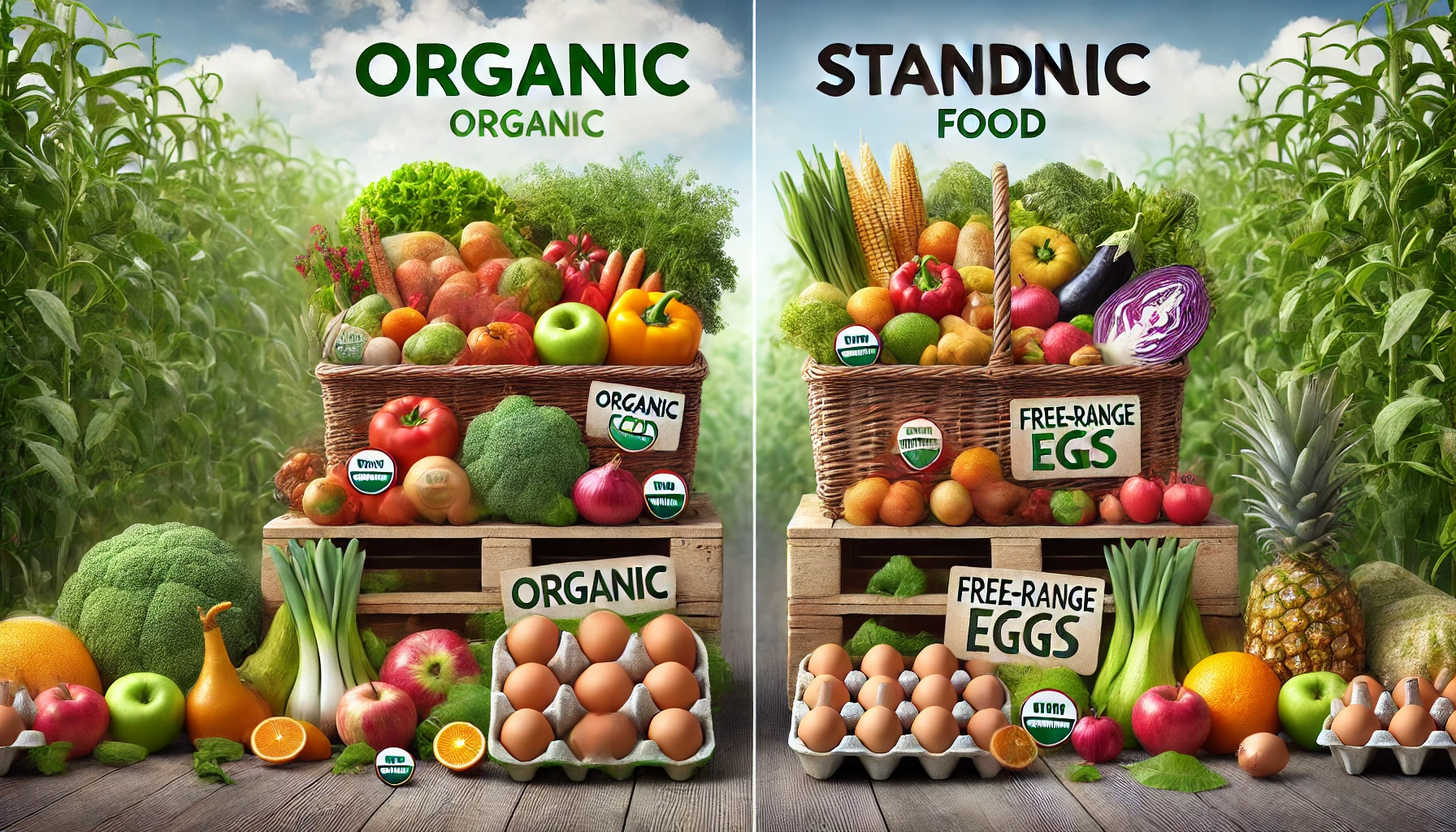Is Organic Food Better? Organic Food vs. Standard Food
In today’s health-conscious world, the debate surrounding organic food versus standard food has gained significant attention. Many people wonder, “Is organic food better?” This comprehensive blog will explore this question in detail, comparing the health benefits, nutritional differences, and potential risks of organic food and standard food. By the end of this article, you’ll have a clear understanding of the pros and cons of organic food and why you might choose it over standard options.
Understanding Organic Food vs. Standard Food
When we talk about organic food, we refer to food produced without synthetic chemicals such as pesticides, fertilizers, and genetically modified organisms (GMOs). In contrast, standard food, often known as conventional food, involves the use of these chemicals to enhance growth and protect crops from pests.
Comparative Analysis: Organic Food vs. Standard Food
Comparing organic food to standard food, several factors come into play, including health benefits, nutritional content, and environmental impact. Here are some key points of comparison:
- Nutritional Differences: Organic food is often touted for having higher nutritional value compared to standard food. Research shows that organic foods can contain higher levels of certain nutrients, such as antioxidants and vitamins.
- Health Risks: Standard food may carry health risks due to pesticide residues and the use of growth hormones in livestock. These chemicals can have long-term health implications.
- Environmental Impact: Organic farming practices are generally more sustainable and environmentally friendly. They promote soil health, reduce pollution, and conserve water compared to conventional farming methods.
Benefits of Organic Food
One of the main reasons people choose organic food is for its perceived health benefits. Organic food offers several advantages over standard food:
- Fewer Pesticides: Organic food contains lower levels of pesticides, which are linked to various health problems, including hormonal disruptions and cancer.
- Higher Nutrient Content: Some studies suggest that organic food has higher levels of antioxidants, which can help protect against chronic diseases.
- Better Taste: Many people claim that organic food tastes better. This could be due to the farming practices that focus on soil health and crop diversity.
- Animal Welfare: Organic livestock farming practices ensure better living conditions for animals, reducing stress and disease.
Is organic food better for you? The answer often depends on individual priorities and health concerns. However, the benefits of organic food in terms of fewer pesticides and higher nutrient content are compelling reasons for many to make the switch.
Standard Food Health Risks
Standard food, while more affordable and widely available, comes with its own set of health risks. Here are some potential concerns associated with standard food consumption:
- Pesticide Exposure: Conventional farming relies heavily on pesticides, which can leave residues on food. These chemicals are associated with various health issues, including neurological problems and cancer.
- Antibiotics and Hormones: Standard livestock farming often uses antibiotics and growth hormones to promote faster growth and prevent disease. These substances can end up in the food supply, potentially leading to antibiotic resistance and hormonal imbalances in humans.
- Nutrient Depletion: Intensive farming practices can deplete soil nutrients, resulting in lower nutrient content in standard food compared to organic alternatives.
Organic vs. Non-Organic Food: What the Research Says
Several studies have examined the differences between organic and non-organic food. Here are some key findings:
- Antioxidants: Organic fruits and vegetables often have higher levels of antioxidants, which help protect the body from oxidative stress.
- Pesticide Residues: Organic food has significantly lower pesticide residues compared to conventional food, reducing the risk of exposure to harmful chemicals.
- Nutritional Content: While the nutritional differences can vary depending on the specific food, organic foods tend to have higher levels of certain vitamins and minerals.
Is organic food better according to these studies? While the differences may not be drastic, the lower pesticide levels and higher antioxidant content make a strong case for choosing organic.
Why Choose Organic Food Over Standard Food?
With all these factors in mind, the decision to choose organic food over standard food can be summarized as follows:
- Healthier Lifestyle: Organic food supports a healthier lifestyle by providing cleaner and potentially more nutritious options.
- Environmental Responsibility: Choosing organic supports farming practices that are better for the planet.
- Ethical Choices: Organic farming often promotes better animal welfare and ethical treatment of livestock.
In conclusion, the debate between organic food vs. standard food revolves around various factors including health benefits, environmental impact, and personal values. The question “Is organic food better?” is subjective, but the advantages of organic food in terms of fewer pesticides, higher nutrient content, and environmental sustainability make it a compelling choice for many. Whether you are making the switch for health reasons or environmental concerns, choosing organic can be a step towards a healthier and more sustainable lifestyle.
References:
For more insights and educational resources on nutrition and healthy living, visit Regent Studies.




